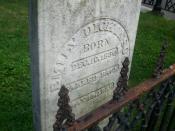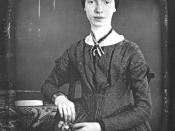Elements that Influenced the Poems of Emily Dickinson
Many times an author's works reveal the events that were occurring during or around the time that they authored some work, whether it be poetry, short fiction, or novel. Sometimes the major events that occur in their lives or things that were constantly present in their lives also appear in the authors' works. Many of Emily Dickinson's poems reflect events or ideas that one can compare with her biography. Such use of personal feelings and influences give her poems their own sense of uniqueness.
Emily Dickinson lived from 1830 to 1886. Her father was a strict Calvinist who disapproved of all books but the Bible and who attempted to force his religion upon his daughter as well. Emily's mother had little influence on her life since she was an extremely passive person who probably did not want to do anything that would contradict Emily's father.
During her younger years, Emily attended Amhurst Academy in Massachusetts and later attended Mount Holyoke Seminary. However, she only attended that college a short while before dropping out. Emily Dickinson was never married though she kept up a continual letter correspondence with Reverend Charles Wadsworth, whom she only met twice, until his death. This man was possibly her only true love. (Jackson) During her life, Emily Dickinson wrote 1700 poems, only ten of which were published during her lifetime. She was known to be extremely reclusive and preferred to wear only white. It was not until after many years after her death that all of her poems were finally published.
Emily's poems often include many key Calvinist terms, such as seal, covenant, ordinance, and promise, even though she basically rejected that religion. One of her poems, "He Put the Belt Around My Life," possibly represents the Calvinist belief in predestination. She says, "Henceforth, a Dedicated sort--/A Member of the Cloud" (Dickinson, "Belt Around My Life" 7-8). This line seems to symbolize Emily's belief or, at least declaration, of the Calvinist belief that God had given her eternal life from the very beginning. "Some Keep the Sabbath Going to Church" tells of her belief that she could be assured of going to heaven without going to church every Sunday as the Calvinists believed one should.
The death of her father seemed to affect Emily Dickinson very much and, therefore, the appearance of death in her poems is not at all uncommon. Many of her poems' entire themes center around death while others just include death somewhere in the picture. In "Because I Could Not Stop for Death," Emily seems to be reliving some of her life experiences after Death picks her up in a carriage and carries her into eternity. The lines "For only Gossamer, my Gown--/My Tippet--only Tulle--" (Dickinson, "Stop for Death" 15-16) allows the reader to visualize Emily in the only color she preferred to wear when she became reclusive: white.
Emily Dickinson's reclusive nature is also reflected in her poem "I'm Nobody! Who Are You?" She seems to declare her enjoyment in being alone rather than constantly in the public eye by declaring "How dreary--to be--Somebody!/How public--like a Frog--" (Dickinson, "I'm Nobody" 5-6).
Those reading Emily Dickinson's poems can often feel her resentment toward her Calvinist upbringing, while at other times feel as if she is attempting to preach that same religion. Although greatly affected by the deaths in her life, her poems on death do no depress her readers as she tends to deal with the subject lightly. Emily Dickinson's use of the important events and common occurrences in her life allow those reading her poems to believe they are getting to know her personally, even long after she has passed away. She seems to have embodied herself into her poems, whether intentionally or not, leaving a piece of her on this earth that will probably live on for many, many more years to come.


